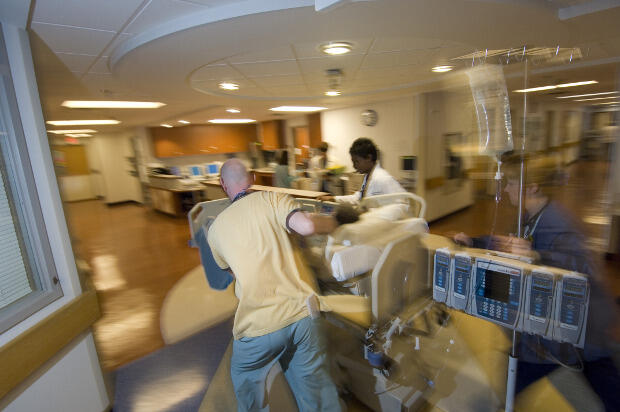
April 5, 2017
VCU School of Medicine recognized for innovative leadership, commitment to improving patient safety
Share this story
Virginia Commonwealth University School of Medicine is part of a nationwide patient safety research team that on April 4 received the 2016 John M. Eisenberg Award for Innovation in Patient Safety and Quality. The award is presented annually by The Joint Commission and the National Quality Forum, two leading organizations that set national standards for patient care.
For three years, VCU School of Medicine’s Department of Internal Medicine has participated in the I-PASS Study Group, which includes more than 50 hospitals across the country dedicated to improving patient safety by standardizing provider communications during patient handoffs, with the goal of reducing miscommunication that can lead to harmful medical errors.
In a large multicenter study published in The New England Journal of Medicine, implementation of I-PASS was associated with a 30 percent reduction in medical errors that harm patients. An estimated 80 percent of the most serious medical errors can be linked to communication failures, particularly during patient handoffs, which occur at all changes of shift and whenever a patient changes location in a hospital.
“The transition of care among health care teams can be a vulnerable time for patients, and miscommunication, omissions and transfers of erroneous information are common,” said Michelle Brooks, M.D., assistant professor of medicine and associate program director at the Department of Internal Medicine’s Quality and Performance Improvement Program. Brooks is the site lead for VCU’s I-PASS Study Group.
The Accreditation Council for Graduate Medical Education has long emphasized the importance of closely managing and monitoring the patient transition process. In 2014, the ACGME added a clause to their Common Program Requirements, which govern all residency programs, stating: “Sponsoring institutions and programs must ensure and monitor effective, structured handover processes to facilitate both continuity of care and patient safety. Programs must ensure that residents are competent in communicating with team members in the handover process.”
VCU’s Department of Internal Medicine residency program seized the opportunity to be one of the 16 initial sites to pilot the I-PASS program.
“We had trained our residents in I-PASS in 2014 and were seeking ways to implement continuous quality improvement surrounding this large handoff initiative,” Brooks said.
VCU played a prominent role in helping to develop and study the I-PASS program. The mentored implementation of I-PASS involved several steps, including training residents in I-PASS methodology, ongoing observations of patient handoffs, submission of observational and survey data to the national I-PASS Study Group and monthly conference calls with off-site mentors.
Since implementing I-PASS, the number of direct observations of handoffs in the Department of Internal Medicine has improved from an average of six observations per month in 2014–15, to almost 18 observations per month in 2016–17.
“This result means that either an attending nocturnist or senior resident is directly observing the residents performing handoffs to ensure that safe handoff procedures are followed and to provide targeted, positive and constructive feedback to the resident performing the handoff,” Brooks said. The program leads have also monitored several metrics to track for quality improvement projects within the residency program, including adherence to the mnemonic, transfers of erroneous information or omissions of important information, and miscommunications.
“This award recognizes the hard work and dedication of our residency leadership team, attending nocturnists, residents and staff in building a robust and sustainable handoff curriculum,” said Peter F. Buckley, M.D., dean of the VCU School of Medicine. “The program has provided us with a platform for continuous quality improvement surrounding handoffs and has ensured that patients remain safe during the transfer of responsibility among care teams. The Eisenberg Award for Innovation represents the highest patient safety and quality award in the country and we are honored to be recognized for our role in this important program.”
Subscribe to VCU News
Subscribe to VCU News at newsletter.vcu.edu and receive a selection of stories, videos, photos, news clips and event listings in your inbox.












